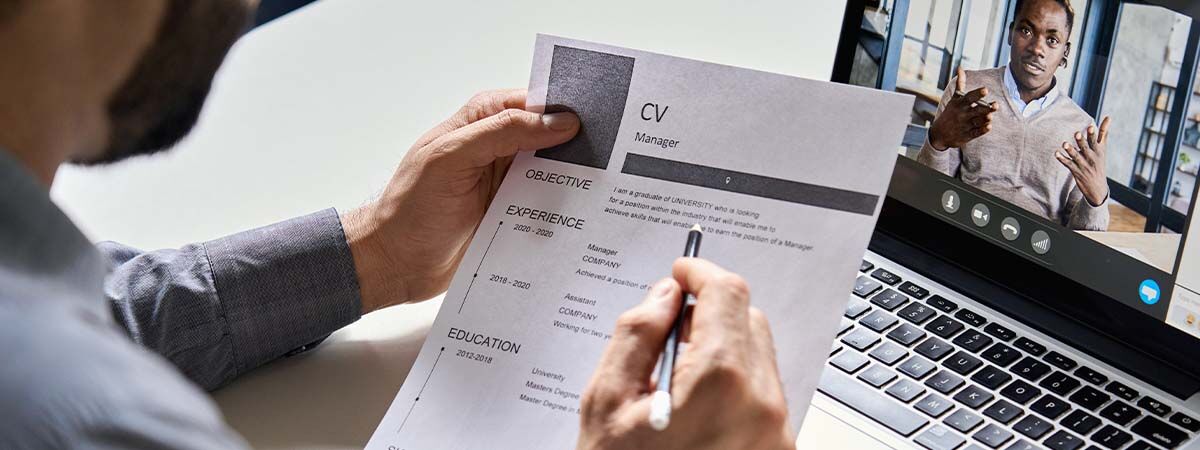Business and HR experts Kelly Rogers and Harry Allen discuss common interview mistakes, share tips for a successful interview and show you how to answer interview questions with impact.
Common interview mistakes
“Bending the truth on your CV is a common mistake people make. Very often you are found out, either through references or during your probation period. It’s always best, to be honest. You can say that you have little experience of X or Y but be honest and don’t over exaggerate this," says senior lecturer in Management, Kelly Rogers.
“The biggest put off for employers is arriving late and treating the person at the front desk poorly when you arrive. Often employers ask the receptionist or persons that book you in on arrival how you behaved. Always be aware that you are being observed from the minute you step into the building or log onto the Teams call.
“One of the biggest employer interview pet peeves is arrogance. It’s good to be confident but try not to be overconfident as this very often reflects arrogance. Fidgeting can also frustrate employers in interviews, if you know you are nervous in interviews - this is OK by the way, interviewers are human - try to think about your posture and if you are someone that fidgets, maybe try positioning your hands in your lap and do not take in a pen as you tend to fidget with it.
“Speaking negatively about your previous employers is a big no. Companies want to hire problem solvers who overcome tough situations. If you’re feeling discouraged about your current job, focus on talking about what you’ve gained from that experience and what you want to do next.
Tips for interview success
“Arrive early and do the journey to the interview - if you can at least once before, as this helps to prepare for any traffic that you may need to be aware of.
“Making a great first impression is essential for interviews. Smile, be polite and dress for the environment you are going into. If it’s an office, then office wear is normally what’s expected. You need to show the employer that you fit in - this doesn’t mean you can’t dress in your own way, just be conscious of the environment that you are going into.
“Showing positivity with a smile and upbeat body language can help keep the interview light and constructive. Being genuine during interview conversations can help employers easily relate to you and make you feel more relaxed, so remember that you are human and that employers like real people rather than robot-sounding individuals.
“Prepare for the interview by reading a little bit about the company – but don’t get too bogged down with this as they won’t expect you to know everything. Try and find out what are they about, do they have any core values that you can link back to when you are answering questions? I always prepare some notes that I take into interviews with me just in case I need a prompt - interviews can be nerve wracking for everyone but remember that you can always ask for a moment to think about an example before sharing it.
“Think about your key strengths: organising, leading teams, developing or mentoring people for example. Then think about what weaknesses you might have and try to put them into a positive statement. For example, if previously you’ve worked with difficult people, here you might say that you enjoy learning about people to be able to support them better rather than highlighting that dealing with difficult people is hard.
“When starting an interview ask how the interviewers are - it’s always nice to be asked. If you get the opportunity to chat or make small talk whilst waiting for the interview, then do so. It’s always good to have looked at the news that day to see what’s happening or if there is something that the company is in the news for – if they have just won an award, for example.
Answering interview questions with impact
“If you don’t know the answer to a question, be honest and ask for a moment to think about the question or ask the interviewer to rephrase the question as this sometimes can help. Try and give an answer as best as you can.
“When an interviewer asks you to tell them about yourself, try and provide examples that relate to the job description or job role, projects you have undertaken and the skills you have. You could also talk about voluntary work or charity work that you may have done.
“Answering questions around your weaknesses can be tricky. You need to be honest here and my advice would be to give an example of something you have worked on to improve already. For example, digital skills – you might say that you recognise you still need to develop these skills to keep up to date with the fast-changing digital environment, you could include what skills you have already - social media, Teams, Zoom, Office packages etc. Another example could be that you talk about working on a project and how this has allowed you to develop good organisational skills or that it has taught you how to work collaboratively with other teams. Employers like these kinds of skills.
“Interviewers usually ask if you have any questions at the end. A lot of people panic at this and don’t know what to say. Good questions include development or training questions, for example what training opportunities are there? Are there opportunities to collaborate with others? You could ask about progression, a question that comes up more and more now is about agile working and flexible working. Can you tell me more about the team I would be working with? How could I impress you in the first three months – this is always a good one!”
Human Resources Management lecturer, Harry Allen, added: “You should be clear in your language, don’t over complicate a response because you think that is what the interviewer wants to hear.
"Prepare examples around the core competencies that the employer is looking for. The competencies and values of a job and organisation may be a clue to the types of questions they are going to ask you.”







